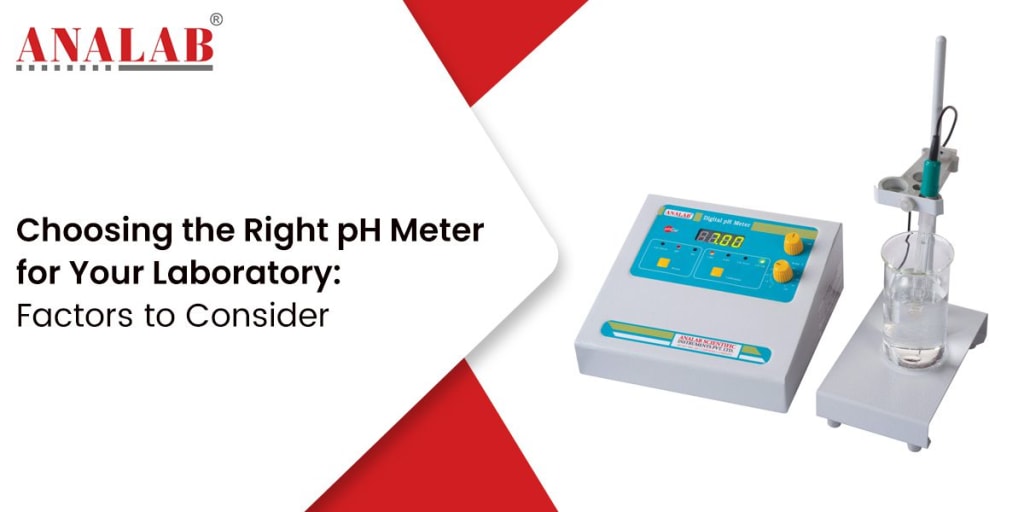Choosing the Right pH Meter for Your Laboratory: Factors to Consider
Analab

In the universe of scientific investigation and study, the utmost importance is placed on precision and accuracy. The significance of precise measurement is of utmost relevance, particularly in disciplines where the pH level assumes a pivotal role, such as environmental research, medicines, the food and beverage sector, and other related fields. The utilisation of a pH meter is imperative in the determination of the acidity or alkalinity of a solution, and the selection of an appropriate instrument for laboratory use is of utmost importance in order to acquire dependable and accurate outcomes.
Why is Choosing the Right pH Meter Important?
The precision of one's experiments and the credibility of one's findings frequently depend on the precision of the measurements conducted. Even a minor deviation in pH levels can have a substantial impact on the outcomes and interpretations of your findings. Consequently, the acquisition of a superior Digital pH meter that aligns with the unique requirements of your laboratory is an essential measure in safeguarding the credibility and precision of your scientific investigations.
Factors to Consider When Choosing a pH Meter:
● Accuracy and Precision:
The principal purpose of a pH meter is to correctly and precisely determine the pH value. Seek a pH meter for water testing or pH meter for the laboratory or a pH meter for the pharmaceutical industry that exhibits a notable degree of accuracy and precision, often quantified as 0.01 pH units. Ensuring the reliability and replicability of results is crucial in order to maintain the integrity of the following studies.
● Type of pH Meter:
There exist multiple varieties of pH meters, including desktop pH meters, Digital pH meters, portable pH meters, and pen-style pH meters. One should contemplate the inherent characteristics of their research and determine whether a stationary pH meter is necessary within the confines of the laboratory or if portability is essential for doing fieldwork.
● Electrode Type:
Various varieties of electrodes are utilised in pH meters, including glass, combination, and reference electrodes. The electrode plays a pivotal role in the detection of the solution's pH. Select an electrode type that is appropriate for your particular applications and the compounds that you intend to analyse.
● Temperature Compensation:
The pH value is known to be influenced by changes in temperature, resulting in fluctuations in pH readings. It is imperative to select a pH meter that possesses a dependable and precise temperature compensation capability in order to effectively address variations in temperature throughout the process of measuring pH levels.
● Calibration and Maintenance:
When evaluating the pH meter, it is important to take into account the level of convenience associated with its calibration and maintenance processes. A pH meter possessing convenient calibration features and necessitating low upkeep would result in time and labour savings, while concurrently guaranteeing continuous precision.
● Resolution:
The term "resolution" in the context of a Digital pH meter pertains to the minimum pH increment that can be detected by the instrument. Increased resolution enables the acquisition of more intricate measurements, a critical aspect in conducting exact scientific investigations.
● Brand and Reputation:
It is advisable to select well-established companies that have a strong reputation for manufacturing pH meters that are of superior quality and with a high level of reliability. To ensure the acquisition of a reliable product, it is advisable to engage in a comprehensive process involving the examination of reviews, solicitation of recommendations, and diligent research.
● Budget:
Develop a financial plan for the acquisition of a pH meter. While it is crucial to give priority to the aspects of quality and usefulness, it is also imperative to take into account the constraint of staying within the allocated budget. It is important to strike a balance between economic considerations and the specific features and capabilities that are necessary for one's laboratory.
● Additional Features:
Additional features can be found in certain pH meters, such as data logging functionality, automatic shutoff mechanisms, numerous measurement modes, and the ability to integrate with other laboratory equipment. Please evaluate whether these further features are in accordance with the requirements and objectives of your laboratory.
● Supplier Support and Warranty:
Select a supplier or manufacturer that offers satisfactory customer service and provides an extensive warranty for the pH meter for the laboratory. This guarantees that individuals receive aid and safeguarding in the event of any problems or malfunctions.
Final Thoughts:
The process of choosing an appropriate pH meter for the pharmaceutical industry or laboratory use is a crucial decision that holds the potential to greatly influence the calibre and dependability of one's research endeavours. When making a decision about the selection of a suitable instrument for laboratory purposes, it is essential to take into account many elements such as accuracy, electrode type, temperature compensation, maintenance requirements, and budgetary constraints. By carefully analysing these aspects, one can make a well-informed choice that is tailored to meet the specific requirements of the laboratory. It is important to note that the acquisition of a high-quality pH meter is a prudent investment that significantly contributes to the precision and reliability of scientific pursuits.
About the Creator
Enjoyed the story? Support the Creator.
Subscribe for free to receive all their stories in your feed. You could also pledge your support or give them a one-off tip, letting them know you appreciate their work.





Comments
There are no comments for this story
Be the first to respond and start the conversation.